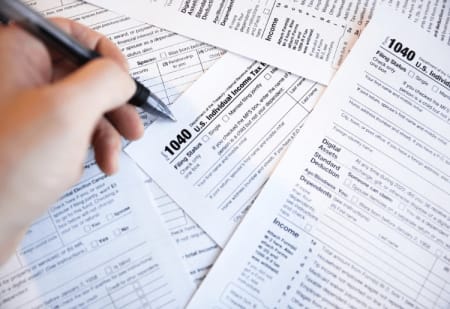Learn More About Tax Relief
Explore different forms of tax relief services with the following resources written by finance professionals.
This site is a free online resource that strives to offer helpful content and comparison features to our visitors. We accept advertising compensation from companies that appear on the site, which may impact the location and order in which brands (and/or their products) are presented, and may also impact the score that is assigned to it. Company listings on this page DO NOT imply endorsement. We do not feature all providers on the market. Except as expressly set forth in our Terms of Use, all representations and warranties regarding the information presented on this page are disclaimed. The information, including pricing, which appears on this site is subject to change at any time.

How Much Do You Have to Make to File Taxes?
The minimum income required to file taxes varies based on your filing status and age.

7 Common Tax Errors That Can Get You In Trouble With the IRS
A single IRS audit can cost you thousands—here's how to protect yourself from common tax filing mistakes. While tax filing may be unavoidable, filing accurately is essential.

What Happens If You Don’t Pay Taxes?
Missing your tax payment? Here's what could happen next. The IRS follows a predictable escalation from penalties, to garnishments, to asset seizure, but timing is critical—the longer you wait, the more expensive and complicated the resolution becomes.

Missed Filing Taxes for Years? Here's How to Catch Up Without Penalties
Life gets complicated. You lost a job, went through a divorce, or your business overwhelmed you, and suddenly, years pass without filing.

How to File a Tax Extension Online
If you need extra time to organize documents, verify income sources, or handle a complex tax situation, filing an extension can prevent filing mistakes that lead to penalties. However, estimating and paying any taxes owed by April 15 is critical. This guide explains exactly how tax extensions work, how to file Form 4868 online, and how to avoid penalties for late filing or late payment.

Capital Gains Tax on Real Estate: A Comprehensive Guide
Selling real estate has significant tax implications that can impact your bottom line.

Business Owner's Guide to Payroll Tax Debt and Trust Fund Penalties
Owning a business and behind on payroll taxes? Here's what to do next.

Tax Relief for Landlords: Smart Ways to Reduce Your Rental Property Tax Burden
This guide covers essential tax deductions, depreciation benefits, passive income rules, loss carryforwards, and relief programs that minimize taxable income.

Tax Planning Strategies
Most people only think about taxes when filing season arrives, but that reactive approach costs them money.

Tax Relief for Americans Living Abroad: How to Avoid Double Taxation on Foreign Income
Unlike nearly every other nation, the U.S. taxes citizens on worldwide income regardless of where they live, potentially costing expats thousands in double taxation annually.

When to Use an Offer in Compromise vs. Bankruptcy for Tax Debt Relief
Drowning in tax debt? You've likely considered an IRS Offer in Compromise (OIC) or Bankruptcy.

How to Reduce Your Taxable Income in 2025
One of the best ways to lower your tax bill is to reduce your taxable income—especially in 2025, as inflation, wage increases, and tax bracket creep could increase tax liabilities for many Americans.

How Gig Workers and Independent Contractors Can Get Tax Relief
IRS relief options include payment plans, penalty abatement, and Offers in Compromise. Prevent future issues by setting aside 25-30% of income and making quarterly estimated payments.

Tax Relief After Divorce or Death of a Spouse: Unique Tax Issues, Deadlines & Relief Options
Going through a divorce or losing a spouse? Here's how to handle joint tax debt and protect yourself from your ex's or deceased spouse's tax liabilities.

11 Tax Scams to Watch for in 2025
Tax season is complex enough without worrying about scammers trying to exploit the system.

Standard Deduction: A Simple Guide to Lowering Your Tax Bill
Learn about standard deduction, the 2025 amounts, eligibility, and claiming process.

How to Pay Less Taxes: Proven Strategies to Reduce Your Tax Bill
Effective tax planning can significantly lower your taxable income, potentially saving you thousands annually and freeing up more of your hard-earned money for saving and investing.

State Tax Debt Relief: What to Do When You Owe Back Taxes to Your State
Relief options include payment plans, settlements, penalty abatement, and hardship status, but vary by state. Contact your state agency immediately when you receive a notice.

How Tariffs Impact Your Wallet - and What Tax Moves Can Help
From electronics to groceries, prices are creeping up - and tariffs may be part of the reason. Whether you're shopping for appliances or simply trying to make your paycheck last, those hidden costs add up fast.

What Is an Income Tax Return and Why Should You Care?
Filing your return isn't just a legal requirement. It's your chance to claim credits, get money back from the IRS, and avoid costly penalties.

What Can Musk's DOGE Mean for the US Economy
Slashing federal red tape, Elon Musk's DOGE emerges as a transformative force in the US economy.

How to Report Tax Fraud to the IRS
Wondering how to report tax fraud to the IRS?

This Is the Average Tax Refund by State: How Does Yours Stack Up?
Tax refunds vary dramatically across America, with some states averaging thousands more than others.

How Long Does It Take to Get a Tax Refund in 2025?
Most taxpayers receive their tax refund within 21 days when filing electronically with direct deposit, though processing times vary significantly based on filing method, accuracy, and specific tax credits claimed.

How To Avoid Paying Taxes on Settlement Money
Receiving a settlement can feel like a financial victory, but the tax implications can quickly turn celebration into confusion.

How to Fill Out a W-4 Form: A Step-by-Step Guide
Completing your W-4 form accurately prevents unexpected tax bills and ensures optimal cash flow throughout the year.

States With No Income Tax: Is It Really a Tax Haven?
Some US states don't charge income tax, which sounds like a dream for your wallet.

2025 Federal Income Tax Brackets and Rates
Federal income tax brackets determine how much tax you pay on different portions of your income, with rates ranging from 10% to 37% in 2025.

How are Bonuses Taxed?
Earning a bonus feels great—whether you anticipated it or not. That extra cash rewards your hard work, celebrates a new job, or marks the holidays.

Trump 2025 Tax Plan: How It Will Affect You
Trump's tax legislation has become reality.

Form 1310 Instructions
Dealing with tax matters after a loved one's death adds complexity to an already difficult time.

Understanding Capital Gains Tax Rates
Capital gains tax rates significantly impact your investment returns and overall financial planning strategy.

Tax Deductible Donations: Guide to Maximizing Tax Savings
Tax-deductible donations offer a win-win opportunity to support causes you care about while potentially lowering what you owe the IRS.

How Are Dividends Taxed?
Dividend income can provide steady payouts for investors, but understanding the tax implications is essential for maximizing your returns.

How Much is Self-Employment Tax?
Working for yourself means handling taxes differently from W-2 employees.

How Does a 1099 Form Work?
Filing taxes involves navigating various forms, and understanding each one helps you stay organized and file correctly.

Is a DOGE Stimulus Check Coming? What You Need to Know
Is that rumored $5,000 DOGE stimulus check actually coming to your account?

Married Filing Jointly vs Separately: How Should You File?
How you file your taxes as a married couple can dramatically impact your refund—or what you owe the IRS.

Tax Attorney or CPA? How to Choose the Right Help
Tax season can feel overwhelming, especially for first-time filers or those whose once-simple returns have suddenly grown complex.

Tax Deductions for Remote Workers: Claiming Expenses in the Age of WFH
The home office deduction could save remote workers thousands—but only if you know which tax rules apply to your situation.

What Is a Tax Refund Advance?
Tax refund advances can be a life raft for anyone struggling to stay financially afloat, but it's vital to understand them, their costs, and available alternatives before you take the plunge.

Why Does Trump Want Tariffs?
Some reasons for the tariffs include countering trade deficits to boosting domestic industries and pressuring foreign competitors.

State Income Tax vs. Federal Income Tax: What You Need to Know
If you’re filing income tax for the first time, you likely have questions about state and federal taxes.

Where is My Tax Refund? | Everything You Need to Know to Receive Your Refund
If you’re like most people, you dread filing your taxes because it can be a tedious, stressful process. However, as soon as you hit submit (or mail in your paper form), you start dreaming about what you’ll do with your IRS tax refund.

How Do I Pay My Taxes? The Ultimate Guide to Stress-Free Tax Filing
Navigating the complexities of tax filing can be daunting, but understanding the essentials can make the process smoother.

How to Structure Your Finances to Pay Less Taxes: 7 Expert Tips to Consider
The average American overpays thousands in taxes each year without realizing it. But you don't have to be one of them.

How to Settle with the IRS by Yourself: Practical Steps to Resolve Your Tax Debt
Settling your debt with the IRS is often more achievable than you think.

The Side Hustle Taxes: How to Avoid Common Mistakes and Maximize Your Earnings
Earning extra income feels great—until tax season hits and you're blindsided by a massive bill. The good news? You can keep more of your side hustle money with the right tax strategy.

